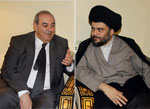 New York Times: Moktada al-Sadr, the anti-American cleric in exile with a sizable bloc of followers in Iraq’s new Parliament, took his first direct public step into the country’s protracted political impasse on Monday, meeting in Syria with Prime Minister Nuri Kamal al-Maliki’s top rival to lead a new government.
New York Times: Moktada al-Sadr, the anti-American cleric in exile with a sizable bloc of followers in Iraq’s new Parliament, took his first direct public step into the country’s protracted political impasse on Monday, meeting in Syria with Prime Minister Nuri Kamal al-Maliki’s top rival to lead a new government.
The New York Times
By STEVEN LEE MYERS
 BAGHDAD — Moktada al-Sadr, the anti-American cleric in exile with a sizable bloc of followers in Iraq’s new Parliament, took his first direct public step into the country’s protracted political impasse on Monday, meeting in Syria with Prime Minister Nuri Kamal al-Maliki’s top rival to lead a new government.
BAGHDAD — Moktada al-Sadr, the anti-American cleric in exile with a sizable bloc of followers in Iraq’s new Parliament, took his first direct public step into the country’s protracted political impasse on Monday, meeting in Syria with Prime Minister Nuri Kamal al-Maliki’s top rival to lead a new government.
Mr. Sadr, a Shiite with a militia that until two years ago openly battled with American and Iraqi forces, has emerged as a potent political leader who could shape the government that oversees the withdrawal of American forces over the next 18 months.
His followers won 39 seats in a new 325-member Parliament formed after national elections in March, and while they have since joined an alliance with Mr. Maliki’s bloc, they oppose his re-election to another four years as prime minister.
Traveling to Damascus from Iran, where he is in a self-imposed exile, Mr. Sadr met with Ayad Allawi, a former Shiite prime minister whose largely Sunni coalition, known as Iraqiya, narrowly defeated Mr. Maliki’s State of Law coalition.
It was the first time that Mr. Sadr, who despite his influence inside Iraq has sought to remain above the political fray, met with any of the leaders vying for ascendancy in the country’s new government. That he met with Mr. Allawi, not his putative coalition partner, was clearly intended to increase pressure on Mr. Maliki to step aside.
“I found a readiness from Iraqiya to make concessions,” Mr. Sadr said of Mr. Allawi’s coalition in remarks broadcast on Iraqi television, “and I call on State of Law to do the same for the general good and for the Iraqi people.”
Whether their meeting has any effect on the deadlock remains to be seen. The efforts to form a new government and elect a prime minister, as well as a president, have taken place largely behind closed doors — and often outside Iraq itself — with only mild public assurances that all involved are acting in the spirit of national unity.
Nearly five months after the election, unity is clearly lacking. That has spawned endless, and often baseless, speculation about various power-sharing agreements that would include Mr. Allawi’s and Mr. Maliki’s coalitions and the Kurds in a majority coalition that requires at least 163 seats in Parliament.
Mr. Allawi, whose coalition won 91 seats, two more than Mr. Maliki’s 89, continued to insist that as the election’s winner he had the constitutional right to lead the next government.
Of his meeting with Mr. Sadr, brokered by Syria’s president, Bashar al-Assad, he said, “Yes, there’s an agreement of the necessity to accelerate the formation of the government, and it must include all Iraqis.”
Fatah al-Sheik, a leader in Mr. Allawi’s slate, said it was the first time the two men had met and called it “the final word, the final decision” in forming a new government without Mr. Maliki, though they had yet to reach a formal agreement on its shape.
“Sayid Moktada is very upset about the delay in the forming of the government,” he said in a telephone interview, using a respectful form of address, “because it has a bad effect on everything.”
Mr. Sadr’s fate in Iraq is unclear. American and Iraqi officials have said that he faces arrest if he returns to Iraq on a warrant that dates to 2004, when he was leading the Shiite resistance to the American occupation.
A significant role for the Sadrists in the new government could complicate American plans for a continued military relationship after the last American troops withdraw by the end of 2011. In his remarks in Syria, he said the Americans had “messed up everything” and continued to destabilize the country.
“I have a red line against the Americans,” he said. When a reporter asked about the loyalists of Saddam Hussein’s Baath Party, many of whom now live in Syria, he said, “I have a red line against them, too, but a little bit less than the Americans.”
The meeting came as violence flared. A bombing in Mosul killed a British security contractor on Monday morning, while a suicide bombing at a cafe in Baquba, the capital of Diyala Province, killed 7 and wounded 17.
Duraid Adnan and Zaid Thaker contributed reporting.


